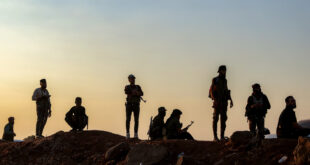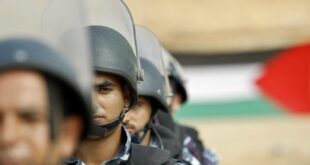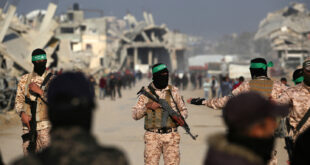 BEIRUT (Reuters) – Lebanese army investigators searched for clues on Thursday in the assassination of a top general who had been tipped to become the next army chief.
BEIRUT (Reuters) – Lebanese army investigators searched for clues on Thursday in the assassination of a top general who had been tipped to become the next army chief.
Brigadier General Francois al-Hajj, killed by a 77 lb car bomb on Wednesday, was a leading contender to replace army chief General Michel Suleiman, who is set to become president next week if an election goes ahead as scheduled.
Lebanese newspapers said one possibility that investigators were looking into was that an Islamist faction may have been behind the killing which took place in the Baabda suburb that houses the presidential palace and foreign embassies.
Hajj had a leading role in the army’s 15-week battle against the al Qaeda-inspired Fatah al-Islam militants at a Palestinian refugee camp in northern Lebanon this year, raising some suspicions that an Islamist group may be behind his slaying.
“It is one of many possibilities, nothing is being discounted,” a security source told Reuters.
The As-Safir newspaper quoted a senior military source as suggesting a possible link to militant Islamists.
“We are in front of a theory that the side which committed the crime may be smaller than al Qaeda but bigger than Fatah al-Islam,” the paper quoted the source as saying.
The killing heightened tensions in Lebanon, which is going through its worst political crisis since the 1975-1990 civil war.
He was the ninth fatality in a string of assassinations that began with the 2005 killing of ex-premier Rafik al-Hariri.
Hajj was the first military officer to be killed, with the other attacks targeting anti-Syrian figures.
Anti-Syrian Lebanese politicians blame Syria for Hariri’s and other political killings but Damascus has consistently denied any involvement and joined Arab and Western nations and the United Nations in condemning Hajj’s assassination.
Pro- and anti-Syrian camps had agreed to nominate Suleiman for the presidency, which has been vacant since Emile Lahoud’s term ended on November 23.
Earlier this week the parliament speaker postponed the election for the eighth time, to December 17, to give the rival groups more time to agree on a process to amend the constitution to allow a public servant to serve in office.
Lebanon’s feuding politicians have said Hajj’s killing showed the need to ease tensions by electing Suleiman quickly.
The army has stayed neutral throughout the political turmoil and is the only institution capable of keeping what is often a tense peace in Lebanon.
Mourners offered condolences at the Baabda home of Hajj, who was married with three children.
 Eurasia Press & News
Eurasia Press & News



